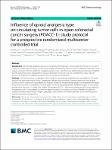Item Infomation
Full metadata record
| DC Field | Value | Language |
|---|---|---|
| dc.contributor.author | Emil, Berta | - |
| dc.contributor.author | Josef, Srovnal | - |
| dc.contributor.author | Petr, Dytrych | - |
| dc.date.accessioned | 2023-03-20T08:35:42Z | - |
| dc.date.available | 2023-03-20T08:35:42Z | - |
| dc.date.issued | 2023 | - |
| dc.identifier.uri | https://link.springer.com/article/10.1186/s12871-023-02007-1 | - |
| dc.identifier.uri | https://dlib.phenikaa-uni.edu.vn/handle/PNK/6996 | - |
| dc.description | CC BY | vi |
| dc.description.abstract | Opioids and epidural analgesia are a mainstay of perioperative analgesia but their influence on cancer recurrence remains unclear. Based on retrospective data, we found that cancer recurrence following colorectal cancer surgery correlates with the number of circulating tumor cells (CTCs) in the early postoperative period. Also, morphine- but not piritramide-based postoperative analgesia increases the presence of CTCs and shortens cancer-specific survival. The influence of epidural analgesia on CTCs has not been studied yet. | vi |
| dc.language.iso | en | vi |
| dc.publisher | Springer | vi |
| dc.subject | circulating tumor cells | vi |
| dc.subject | open colorectal cancer surgery | vi |
| dc.title | Influence of opioid analgesia type on circulating tumor cells in open colorectal cancer surgery (POACC-1): study protocol for a prospective randomized multicenter controlled trial | vi |
| dc.type | Book | vi |
| Appears in Collections | ||
| OER- Y học- Điều dưỡng | ||
Files in This Item:

